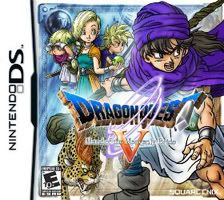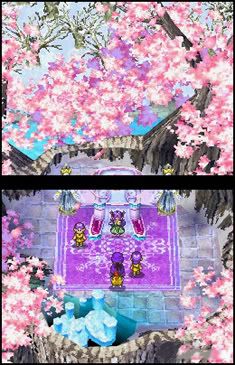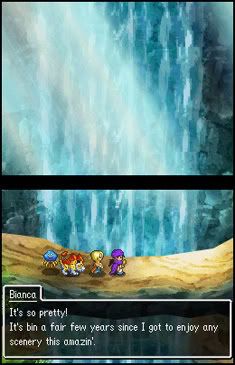
Dragon Quest V: Hand of the Heavenly Bride
Genre: RPG
Developer: Chunsoft (original game), ArtePiazza (remake)
Publisher: Square Enix
Release Date: 02/17/2009
Since the genre gained mainstream popularity in North America in the late 90s, most major Japanese RPGs that we missed out on at first, have made the journey across the Pacific in some form or another (well except Mother 1 and 3 of course. Nintendo just loves watching the Starmen.net kiddies suffer far too much). One glaring exception has been Dragon Quest V. One of the most (perhaps the most) beloved JRPGs of all-time in it’s homeland, we’ve so far been denied an official English version of DQV due to a various bad timing and business factors. Well after a long wait Dragon Quest V is finally hitting American shelves, but is it worthy of the affection (not to mention around 6 million in sales) the Japanese have lavished it with over the years?
1) Story
On the surface all Dragon Quest plots are pretty much the same. You’re a mute male protagonist who either is, or is looking for, a “chosen one” who prophecy says must do battle with the ancient evil that’s threatening the world. Dragon Quest V is no different, but the art of a good Dragon Quest storyline is in the telling, not the plot itself.
Every DQ game since IV takes a unique approach to telling essentially the same archetypal fantasy storyline. In the case of V, you follow a single character across several generations, starting with him as a 6-year-old child, then as a young man, then as an older man with children of his own. It’s essentially the same technique used in Phantasy Star III, but everything Sega did wrong in that game is done oh-so-right here. Whereas it was largely a shallow gimmick in PSIII, resulting in a slew of generic characters differentiated only by their hairstyle, Dragon Quest V‘s multigenerational storyline brings an impressive depth and humanity to it’s cast. So often RPGs focus on grand themes, or shocking events, but while they’re busy staging huge battles or blowing up planets, the little things are lost sight of. It’s the human moments that we can all relate to that actually bond us with a story and it’s characters, and this game is chock full of them. From your young character faithfully following the dad he reveres, to marrying your childhood sweetheart, to seeing your first children born, this game gets it’s hooks in you. Also, since you actually care about the characters the requisite handful of deaths, twists and betrayals actually have a real effect on you. This is some masterful storytelling on Yuji Horii’s part.
I suppose I should also address the fact that there’s been some whining amongst fans about the translation. Not that the game is inaccurate or sloppy, but simply that certain things have been tweaked or added (Names have been changed, various European “accents” added to some character’s dialogue and so on.). Since this is the first official English translation of the game ever though, this means the complainers would have to fall into one of two camps.
1) Those who have played the game in its original Japanese. If you’re in this camp and are pissed over a handful of name changes, well you clearly don’t know the difference between straight translation and localization. It’s a good idea to educate yourself before you make a fuss over something. You’ll find that 99% of games that go from Japan to the US have undergone similar changes.
2) Those who have only played unauthorized fan translations and are angry that this version doesn’t match up to what a 16-year old kid with a Japanese-English dictionary wrote in his mother’s basement. If you’re in this group, well honestly, get a freakin’ life.
Modes Rating: Unparalleled

2) Graphics
On a technical level Dragon Quest V‘s visuals are pretty much identical to those of Dragon Quest IV on the DS before it, which of course makes sense since ArtePiazza is remaking DQIV through VI for the DS all in one go. That said, it can’t be denied that a bit of the “specialness” of a sequel is taken away when much of it looks exactly the same as its predecessor.
Which isn’t to say this is a bad looking game; it has its charms. Graphically it’s comparable to Dragon Quest VII for the PS1, with the overworld and dungeons being done in simple 3D and characters and monsters being 2D sprites. DQV may not throw around a huge number of polygons, but the world is varied and, in it’s own way, quite detailed, and the hand-drawn monster sprites during battles look fantastic. In fact I’d go so far as to say this might be the best translation of Akira Toriyama’s unique art into video game form I’ve seen. Yes, even better than the technically much superior Dragon Quest VIII. Toriyama’s character designs just don’t translate into 3D that well, they’re meant to stay flat, and these sharp, wonderfully animated sprites are just the ticket.
Also, while this game may use the same engine as DQIV, its visuals are more ambitious and varied overall, and as a bonus the occasional slowdown that cropped up in IV has been cleaned up for V. A very solid, if not quite stunning, visual package.
Graphics Rating: Good
3) Sound
Koichi Sugiyama’s score for the game is predictably excellent. Granted the game reuses a lot of tunes from past titles, but then a Dragon Quest game without the classic Overture or Battle Theme would be like a Star Wars movie without the Imperial March or porn without 80s synthesizers in the background. It’s just not the same man. Fantastic music, fun retro sound effects, and the lack of voice work isn’t really missed (it’s not like it would really be feasible on a non-disc based system anyways).
Sound Rating: Incredible
4) Control and Gameplay
All the Dragon Quest games tend to stick close to the basic Japanese RPG template (which they created). You visit towns, buy equipment and collect information on where to go next, then hack into various dungeons engaging in countless turn based battles. It may sound somewhat bland, but the fun is found in the details. The world you explore really feels alive, with no two dungeons or towns being alike, and while the battle system is a simple affair only giving you the options to attack, defend, use magic or use items, the pace is brisk enough and the enemies are varied enough in design and tactics that battling rarely feels like a drag. Dragon Quest doesn’t need the overly complicated battle systems and gimmicks that most modern RPGs hide behind; the focus is instead on polishing the basics to a glossy shine.
The one major addition that DQV brings to the table is the ability to recruit many of the monsters you encounter to your party. Now before you accuse this game of ripping off Pokemon, realize Dragon Quest V came out around 3-years before Pokemon Red & Blue, and in many ways its monster recruiting system is still more advanced than anything Pokemon has ever done. The monsters that join you act as full-fledged party members that gain a whole long list of spells as they level up (as opposed to only being able to use 4), can be equipped with a full compliment of armor and weapons and you’re free to mix and match regular human characters and monsters as you wish (Unlike Pokemon where you’re restricted to only using critters with no personality to speak of.).
Control-wise the game ignores the stylus and is controlled entirely with the buttons, which I won’t complain about, particularly since the last DS RPG I played was the hand destroying Magical Starsign (which I found in a bargain bin for 5 bucks).
Control and Gameplay Rating: Amazing
5) Replayability
This game serves up a good mid-length quest for an RPG, which should take you around 25 – 30 hours to beat. Add in the requisite handful of side quests, the “gotta catch “Ëœem all” appeal of the monster collecting, and draw of playing through again so you can choose a different wife and you have a pretty damn meaty experience for 40-bucks.
Replayability Rating: Incredible

6) Balance
Right from the beginning the Dragon Quest games have been designed to be subtly more accessible than most other JRPGs. DQV is certainly no pushover, enemies can be tough and you will die, but a number of design decisions take the edge off. Dungeons are usually rather short and focused on solving a handful of puzzles rather than wandering around endless mazes, and dying in Dragon Quest isn’t “Game Over”Â, you’re simply transported to the last church you saved at with half your money gone, but with all your treasure, experience and progress you made before you were defeated left intact. Using the experience points and knowledge of the dungeon you gained on your first attempt, you can usually get through it on your 2nd try without having to do any of the tedious leveling most RPGs force on you. Dragon Quest V removes most of the grind without feeling patronizing.
Balance Rating: Unparalleled
7) Originality
This is a tough category when it comes to remakes. Obviously a remake isn’t going to bring much new to the table, but what about the original game’s innovations? The original SNES game gave us the brilliant monster recruiting system that went on to influence the most popular RPG series of all time! Surely indirectly leading to the creation of Pikachu counts for something, am I right Lucard? I guess we’ll just call this one down the middle.
Originality Rating: Mediocre
8) Addictiveness
I usually don’t play handheld games for more than about half-an-hour at a time. It doesn’t really matter how good they are, I just can’t stare at those tiny screens for too long. This game on the other hand often held me rapt for 3 or 4 hours straight. My writing schedule for other websites was shot all to hell because I couldn’t put this damn thing down. So yeah, I’d say it qualifies as pretty damn addictive.
Addictiveness Rating: Amazing
9) Appeal Factor
For whatever reason North Americans don’t really care much for Dragon Quest (A major reason likely being that they haven’t got to play DQV up until now). Square Enix isn’t doing much to raise the hype factor either with its low-key promotion of a game whose arrival should be, in theory at least, a pretty big deal.
Also I wonder, will the fact this game hasn’t been released here before help or hurt it? Will people be more likely to buy DQV than DQIV because it’s a “new” game (as far as Americans are concerned) or will it flop without nostalgia to fuel sales? It will be interesting to see.
Appeal Factor Rating: Decent
10) Miscellaneous
I’m pretty much just glad to see this game finally hit Western shores. Square Enix knew this game’s American sales would only be a tiny fraction of what it sold in Japan, but it went through the trouble of translating it anyways. There tends to be a lot of Squuenix bashing around here, but there’s some good in their black hearts after all.
They also added a handful of little extras to the DS version of this game over and above the PS2 remake it was based on. Most notably there’s now a new 3rd girl you can marry. Giving a guy extra tail to chase is always appreciated.
Miscellaneous Rating: Unparalleled
The Scores
Story/Modes: Unparalleled
Graphics: Good
Sound: Incredible
Control and Gameplay: Amazing
Replayability: Incredible
Balance: Unparalleled
Originality: Mediocre
Addictiveness: Amazing
Appeal Factor: Decent
Miscellaneous: Unparalleled
Final Score: Incredible Game
Short Attention Span Summary
This game really deserves more hype than it’s getting. After playing through Dragon Quest V I feel confident calling it a lost RPG classic, the equal of giants of the 16-bit era like Final Fantasy VI, Chrono Trigger and Phantasy Star IV (in fact I’d consider it better than at least one of those games). Unless you completely hate RPGs this game absolutely needs to be in your DS as soon as possible, plain and simple.
Leave a Reply